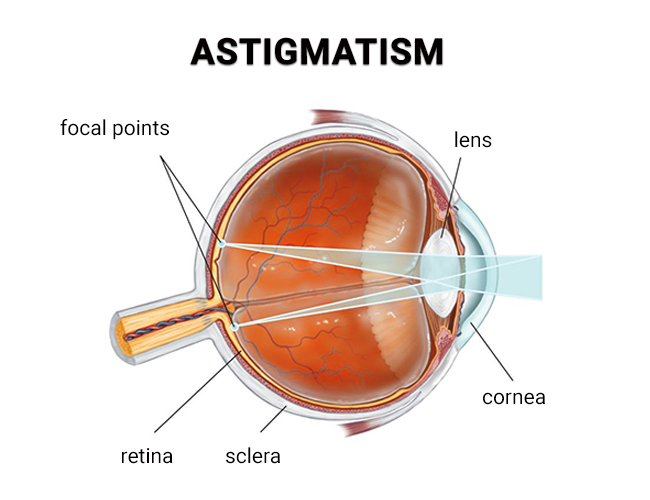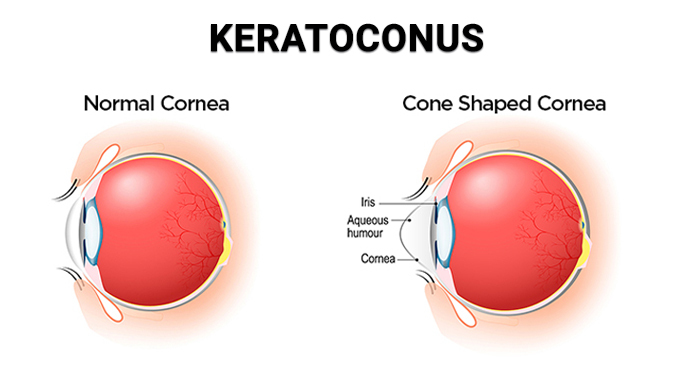 (212) 861-9797
(212) 861-9797
 (212) 861-9797
(212) 861-9797
Astigmatism is a common eye problem for more than 33 percent of the U.S. population. While it’s typically inherited from your parents, the refractive error can also occur due to an eye injury, following surgery or from various eye diseases. Because of the nature of astigmatism, it’s recommended that you visit a trained ophthalmologist to get a correct diagnosis to prevent further complications. In New York City, the largest and most well-established eye care practice employs the best ophthalmologists. These eye experts provide a wide range of ocular services at three locations: in Westchester, Manhattan and Brooklyn. Call today for an evaluation.
Astigmatism is a condition that can cause blurry vision at all distances. It’s a common problem that occurs when the shape of your cornea or lens develops irregularly. The cornea is the clear covering over the iris and lens. It’s usually shaped like a sphere, but with astigmatism, the cornea may warp abnormally to turn oval or even football-shaped.

Astigmatism falls into the category of eye problems known as refractive errors. In normal eyes, incoming light is focused squarely on the retina at the back of the eye. With refractive errors, an abnormal shape of the eye prevents light from being focused correctly on the retina, making it difficult to see clearly. Astigmatism can occur along with other refractive errors, such as nearsightedness and farsightedness.
If you’re looking for the best eye doctors, look no further than Vitreous Retina Macular Consultants of New York (VRMNY). This is the largest retina and ophthalmology practice in the New York Metropolitan area. These eye professionals include internationally known leaders in diagnosing and treating a multitude of eye conditions.
Astigmatism isn’t always severe enough to cause symptoms. It’s often discovered by accident during a routine eye exam. If you do experience symptoms, blurred or distorted vision is the most common symptom of astigmatism. Other symptoms you may experience include:
Having these symptoms doesn’t necessarily mean you have astigmatism, since other eye conditions cause similar symptoms. But that’s why you need to turn to top-rated ophthalmologists to ensure you get a correct diagnosis. By submitting to a complete eye exam, which may include diagnostic imaging, you allow your NYC ophthalmologist at VRMNY to diagnose what’s causing the symptoms you’re experiencing and recommend the best course of treatment.
The cause of astigmatism isn’t fully understood. Astigmatism often runs in families. In many people, it’s present from birth. Other possible causes of astigmatism include:

The curvature of the lens in your eye sometimes changes in adulthood, which may precede the development of cataracts. Ultimately, there’s no way to prevent astigmatism from occurring. Counter to many of the myths surrounding astigmatism, squinting and reading in poor light don’t cause the eye condition, and these habits don’t make it worse.
The imperfection of your eye caused by astigmatism is usually treatable. Mild cases of astigmatism may not even require treatment. Astigmatism correction includes:
During your comprehensive eye exam, your NYC ophthalmologist measures how your eyes focus light, which is known as refraction. This test helps your doctor determine what prescription you need to provide clear vision.
One of the most professional, knowledgeable and yet friendly team of doctors and professionals in NYC. I have never had my eyes examined so thoroughly and feel so much better knowing that my eyes are in good hands. Dr Klein himself attends to almost all patients and the level of attention and care is phenomenal.
ROBIN G. GoogleAstigmatism surgery may be the answer for you if you don’t want to deal with the maintenance of corrective lenses. If your doctor agrees, you may be a candidate for LASIK eye surgery, as long as you have otherwise healthy eyes. It’s an outpatient procedure that usually takes fewer than 30 minutes. The LASIK surgery for astigmatism follows a number of steps, including:
Astigmatism correction surgery has a short recovery period. Another type of surgery for astigmatism is photorefractive keratectomy or PRK. During this procedure, a pulsing beam of ultraviolet light is used on the surface of the cornea rather than under a corneal flap. After LASIK for astigmatism, you may be able to resume normal activities the next day. After PRK surgery, your vision may be blurry for a few days.
Your eyesight is one of your most precious senses, so trust the care of your eyes to skilled and experienced ophthalmology professionals. For expert eyecare in New York City, your best choice is Vitreous Retina Macula Consultants of New York. At VRMNY, you get prompt care, an accurate diagnosis and an individualized treatment plan.
These NYC ophthalmologists specialize in treating all medical and surgical retinal conditions. They’re available for 24/7 on-call support. They have conveniently located state-of-the-art offices in Brooklyn, Manhattan and Westchester, with more than 60 staff members providing a full range of educational, medical and surgical services. Contact the nearest office to make an appointment.
Let us help you enjoy your life
Call: (212) 861-9797To Speak With An Appointment Coordinator Now